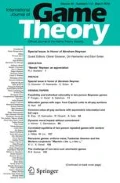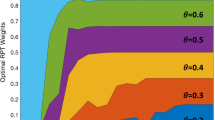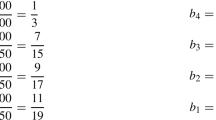Abstract
Starting from her home, a service provider visits several customers, following a predetermined route, and returns home after all customers are visited. The problem is to find a fair allocation of the total cost of this tour among the customers served. A transferable-utility cooperative game can be associated with this cost allocation problem. We introduce a new class of games, which we refer as the fixed-route traveling salesman games with appointments. We characterize the Shapley value in this class using a property which requires that sponsors do not benefit from mergers, or splitting into a set of sponsors.
Similar content being viewed by others
References
Chun Y (2006) A pessimistic approach to the queuing problem. Math Soc Sci 51(2): 171–181
Chun Y (2011) Consistency and monotonicity in sequencing problems. Int J Game Theory 20(2): 183–190
Derks J, Kuipers J (1997) On the core of routing games. Int J Game Theory 26: 193–205
Derks J, Tijs S (2000) On merge properties of the Shapley value. Int Game Theory Rev 2: 249–257
Engevall S, Gothe-Lundgren M, Varbrand P (1998) The traveling salesman game: an application of cost allocation in a gas and oil company. Ann Oper Res 82: 453–472
Fishburn PC, Pollak HO (1983) Fixed-route cost allocation. Am Math Mon 90: 366–378
Haller H (1994) Collusion properties of values. Int J Game Theory 23: 261–281
Hart S, Mas-Colell A (1989) Potential, value, and consistency. Econometrica 57: 589–614
Jackson MO, Wolinsky A (1996) A strategic model of social and economic network. J Econ Theory 71: 44–74
Kar A (2002) Axiomatization of the Shapley value on minimum cost spanning tree games. Games Econ Behav 38: 265–277
Knudsen PH, Østerdal LP (2005) Merging and splitting in cooperative games: some (im-)possibility results. Discussion Papers, Department of Economics, University of Copenhagen, pp 05–19
Kuipers J (1993) A note on the 5-person traveling salesman game. Methods Models Oper Res 38: 131–139
Lehrer E (1988) An axiomatization of the Banzhaf value. Int J Game Theory 17: 89–99
Maniquet F (2003) A characterization of the Shapley value in queueing problems. J Econ Theory 109(1): 90–103
Moulin H (2007) On scheduling fees to prevent merging, splitting, and transferring of jobs. Math Oper Res 32: 266–283
Myerson R (1977) Graphs and cooperation in games. Math Oper Res 2: 225–229
Potters JAM, Curiel IJ, Tijs SH (1992) Traveling salesman games. Math Program 53: 199–211
Shapley LS (1971) Core of convex games. Int J Game Theory 1: 11–26
Tamir A (1989) On the core of a traveling salesman cost allocation game. Oper Res Lett 8: 31–34
Author information
Authors and Affiliations
Corresponding author
Additional information
The first draft of this paper was written when I was a Ph.D. student in the University of Rochester.
Rights and permissions
About this article
Cite this article
Yengin, D. Characterizing the Shapley value in fixed-route traveling salesman problems with appointments. Int J Game Theory 41, 271–299 (2012). https://doi.org/10.1007/s00182-011-0285-7
Received:
Accepted:
Published:
Issue Date:
DOI: https://doi.org/10.1007/s00182-011-0285-7
Keywords
- Fixed-route traveling salesman games
- Routing games
- Appointment games
- The Shapley value
- The core
- Transferable-utility games
- Merging and splitting proofness
- Networks
- Cost allocation




